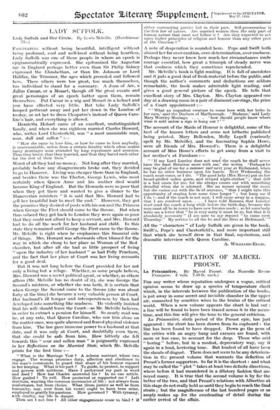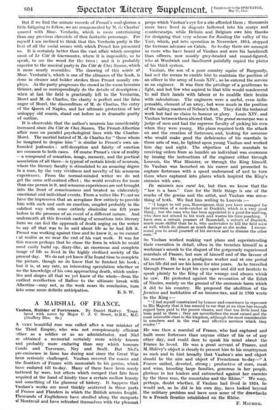THE REPUTATION OF MARCEL PROUST.
La Prisanniere. By Marcel Proust. (La Nouvelle Revue Frangaise. 2 vols. 7.50 fr. each.)
Fox any writer whose reputation undergoes a vogue, critical opinion seems to draw up a species of temperature chart which, in the intervals between the publication of the books, is put away in some secret and invisible chamber in the upper air, connected by sensitive wires to the brains of the critical world. When a new volume appears the chart is had out : a line will be found to have been traced across it in the mean- time, and this line will give the tone to the general criticism.
La Prisonnilre, sixth period of the Proust epic, has just appeared : the chart has been drawn from its cupboard : the line has been found to have dropped. Down go the pens of the critics with an angry bang and excuses are found, with more or less ease, to account for the drop. Those who said " boring " before, but in a modest, deprecatory way, say it again in a loud, hectoring tone. But loudest of all have been the shouts of disgust. There does not seem to be any deteriora- tion in the present volume that warrants the defection of Proust's former supporters. So far it is the shortest : and what may be called the " plot " takes at least two definite directions, where before it had meandered in a dilatory fashion that an- noyed many. It is true that the second volume is by far the better of the two, and that Proust's relations with Albertinc at this stage do not really hold us until they begin to reach the final strain ; but the magnificence of the last hundred pages or so amply makes up for the overloading of detail during the earlier period of the affair.
But if we find the minute records of Proust's soul-Storms a little fatiguing to follow, we are compensated by M. dc Charlus' quarrel with Mmc. Verdurin, which is more entertaining than any previous chronicle of that fantastic personage. For myself I am inclined to think that this Verdurin party is the best of all the social scenes with which Proust has presented us. It is certainly better than the vast affair which occupies most of Le COM de Guermantes, where it is impossible, so to speak, to see the wood for the trees ; and it is probably superior to the musical party in Du COM de Chez Swann, which it more nearly resembles. The drawing of this soirée at Mme. Verdurin's, which is one of the climaxes of the book, is done in cleaner and bolder strokes than Proust usually em- ploys. As the party progresses the crowd in the room becomes thinner, and so correspondingly do the details of description ; when at last the field is practically left to the Verdurins, Morel and M. de Charlus, the clarity is perfect and the false anger of Morel, the discomfiture of M. de Charlus, the entry of the Queen of Naples, and her ultimate protection of her unhappy old cousin, stand out before us in dramatic purity of outline.
It is observable that the author's neurosis has considerably increased since Du COM de Chez Swann. The Proust-Albertine affair runs on parallel psychological lines with the Charlus- Morel. The morbid hatred of M. de Charlus for " those whom he imagined to despise him " is similar to Proust's own un- founded jealousies : self-deception and falsity of emotion are common to both cases. Of course Proust's view of reality —a compound of sensation, image, memory, and the poetical association of all three—is typical of certain kinds of neurosis, where the literary faculty is stimulated to an amazing degree in a man, by the very vividness and novelty of his sensuous experiences. From the normal-minded writer we do not get the same self-centred effect ; the world revolves for more than one person in it, and sensuous experiences are not brought into the front of consciousness and treated as elaborately emotional and individual events. From a writer Like Proust we have the impression that an aeroplane flew entirely to provide him with such and such an emotion, coupled probably in the subtlest way with some entirely dissimilar one felt years before in the presence of an event of a different nature. And underneath all this feverish casting of sensations into literary form we can feel the approach of death urging on the writer to say all that was to be said about life as he had felt it. Proust was working against time and he knew it, as we cannot i ut realize as we near the end of his vast work. It was for this reason perhaps that he chose the form in which he could most easily build up, diary-like, an enormous and complete image of life as lived in the highly civilized society of the present day. We do not yet know if he found time to complete the picture, though we do know that he finished his book ; but it is, at any rate, an interesting speculation whether or no the knowledge of his own approaching death, which under- lies and shapes all that we yet know of the whole—from the earliest recollection of Balbec to the ultimate break with Albertine—may not, as the work nears its conclusion, turn



















































 Previous page
Previous page